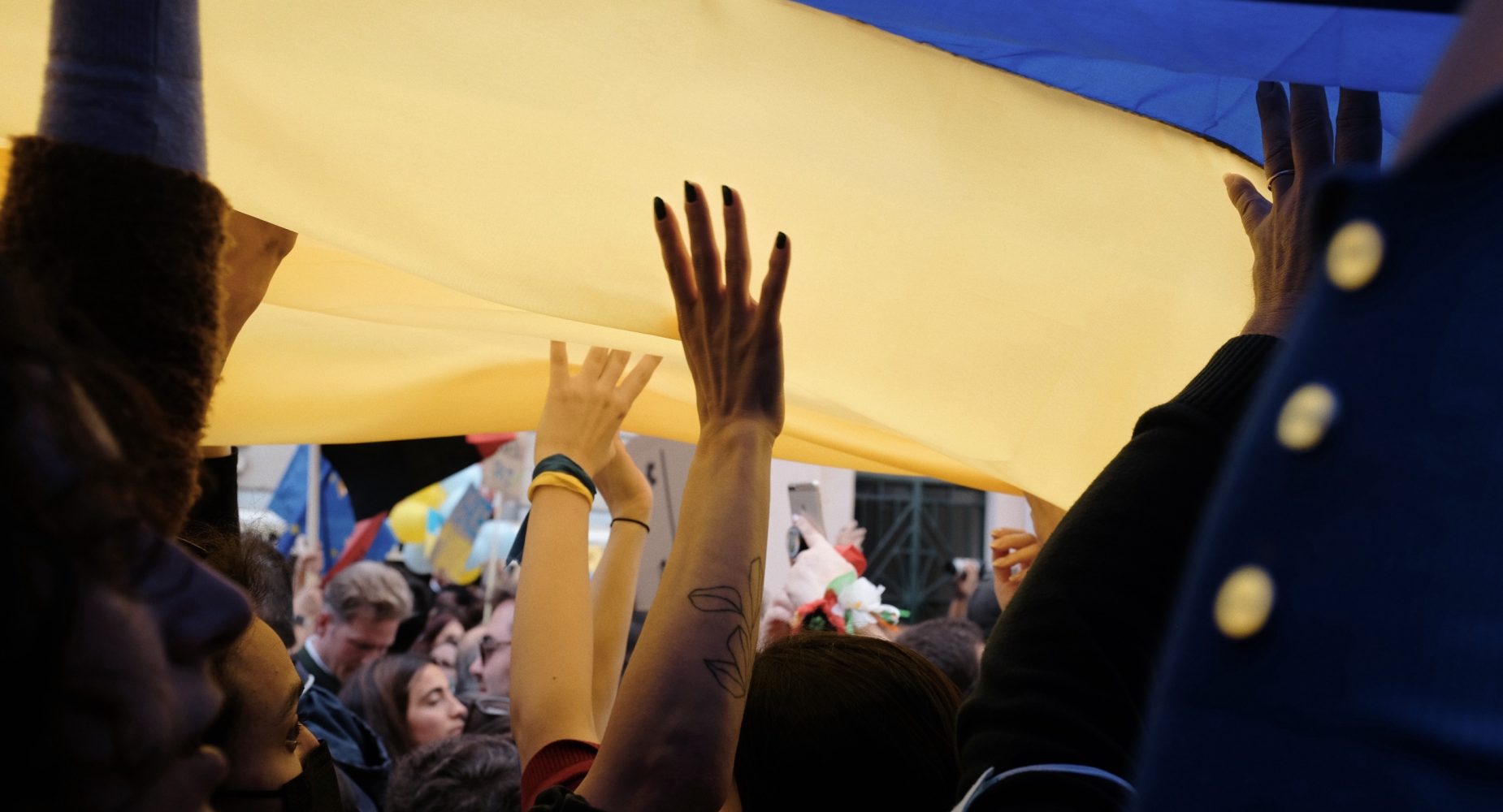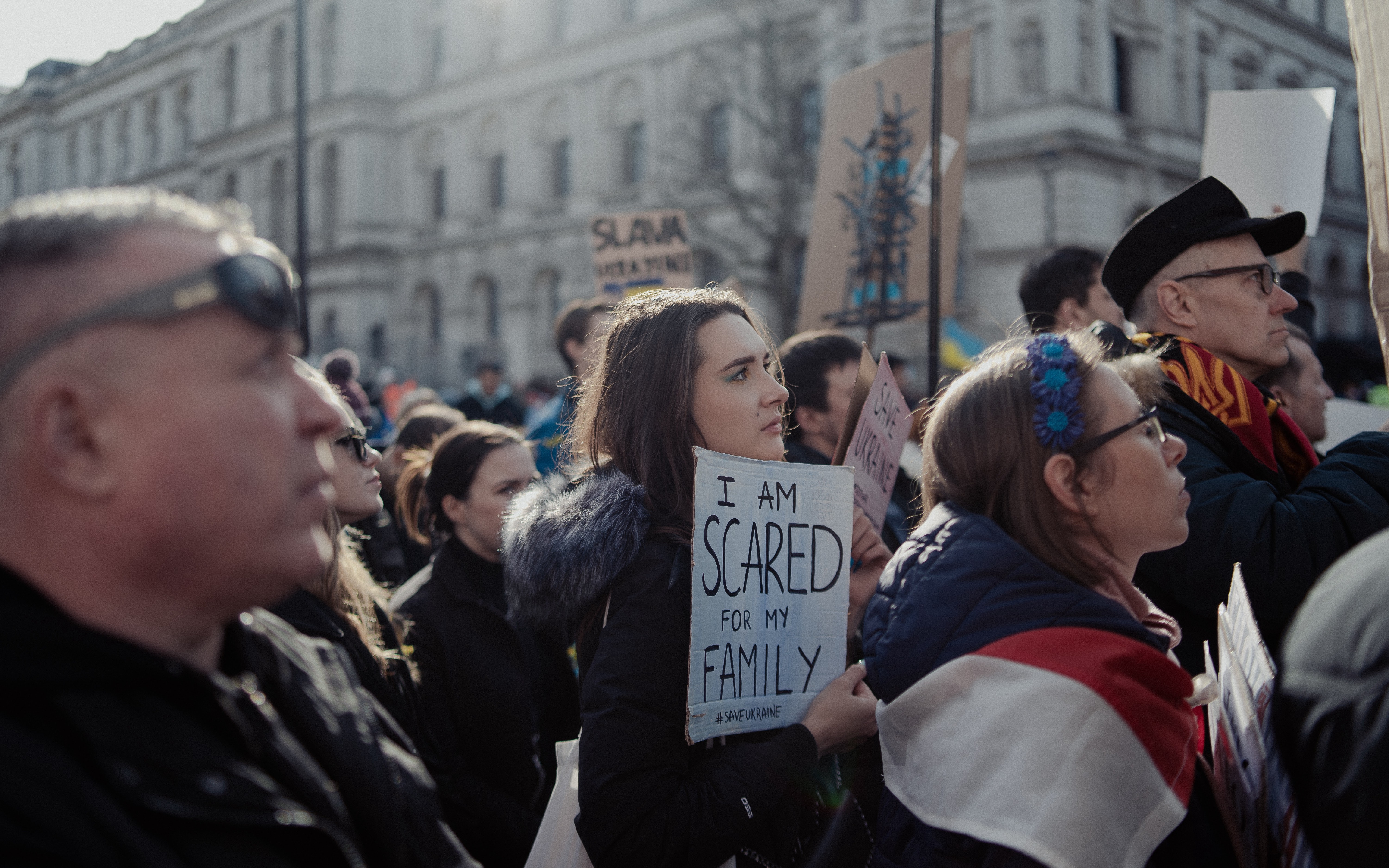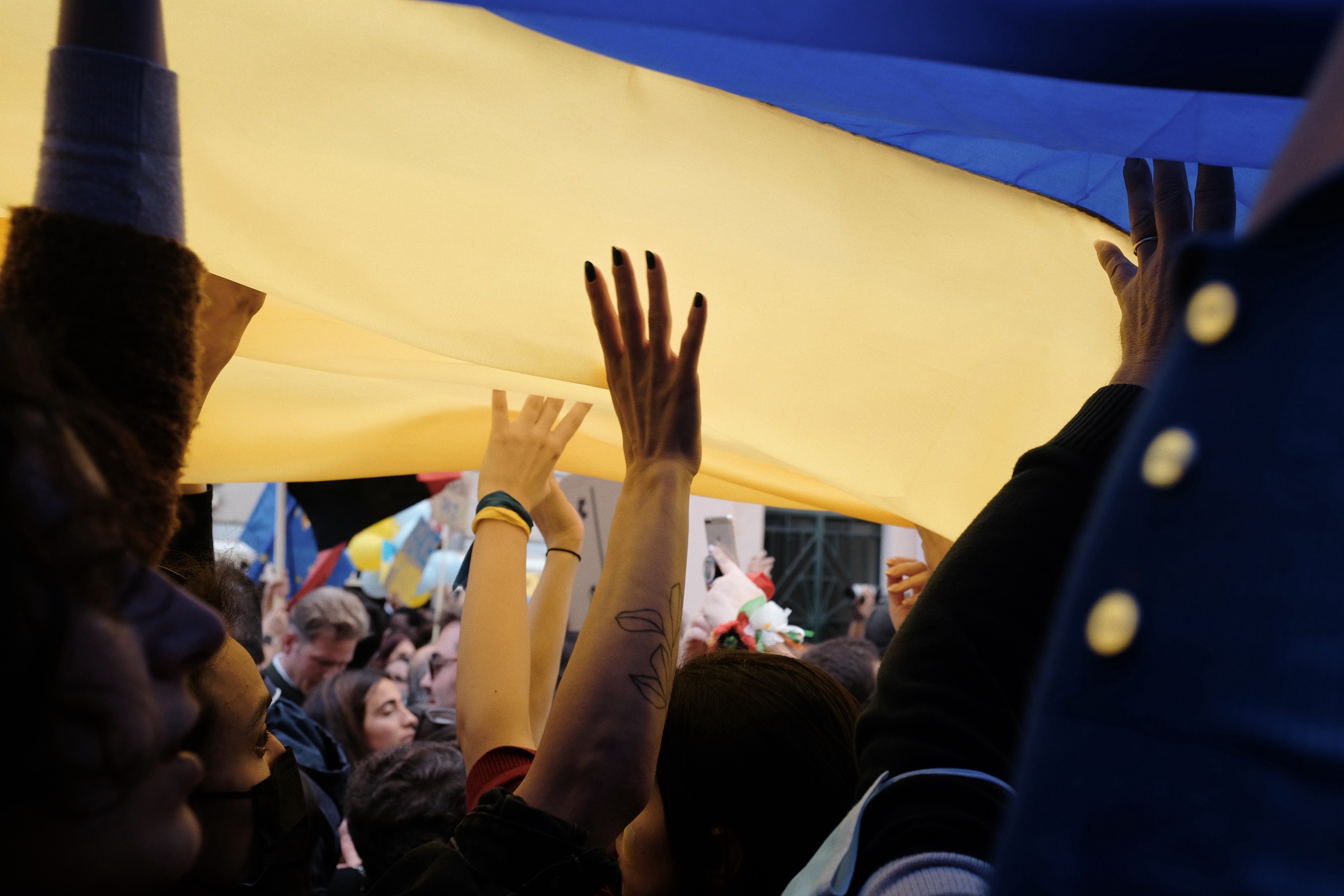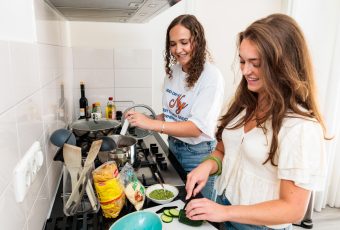
“I find the war with Ukraine barbaric and fear it will lead to the destruction of both countries”
HAN students from Ukraine and Russia on the war, part 4: Elena
Scroll omlaag voor de Nederlandse versie
War in Europe. It touches us all deeply. But it is much worse for the 800 Ukrainian students in our country who are worried about family and friends in Ukraine. Many of the 1,300 Russian students are also struggling with the situation. Nearly 70 students from these two countries study at HAN. SAM speaks with some of them. In part four: the Russian Elena, student at the HAN International School of Business.
Elena’s name has been changed for security reasons. Like many other Russians, she is in a difficult position. She is firmly against the war in Ukraine but is not allowed to say anything about it. With this interview she goes against the new legislation in Russia that forbids the population from spreading news other than what the state media tell. Those who do not comply with this risk a prison sentence of 15 years and a fine of up to 43,000 euros.
Awkward silence
In the Netherlands, Elena is part of a chat group. It contains students from the Slavic community, residents of countries of the former Soviet Union. So also Ukrainians and Russians. “When Russia invaded Ukraine, the chat group was silent the first day. I hated that our country has invaded Ukraine and what is happening. Because our country is the aggressor, we, the Russian students, didn’t really know what to say in the chat group and kept quiet.
We understood that the Ukrainian students were very angry and wanted to share all kinds of stories from family and friends. I was afraid we would be kicked out of the chat group, but that hasn’t happened yet. We still keep aloof for fear of saying the wrong thing.”
Barbaric
After a few days, Elena decided to respond anyway: “I told the group that I am against the invasion. I find it barbaric and fear it will lead to the destruction of both countries.
I also understand that Ukrainian students are now living full of fear and pain. The uncertainty about how your family and friends are doing seems terrible to me. I have good Ukrainian friends. I feel for them and want to comfort them, but yes, I am part of the country that is doing this to them.”
“You can’t say you’re against the war, you can’t support the Ukrainians, you can’t volunteer to help Ukrainians”
One big family
But history shows that Russia and Ukraine are one big family. “Yes, that’s right. And it has been that way for a long time, despite Ukraine’s secession from Russia years ago. My father is of Ukrainian descent. He has family and friends living in Ukraine. He moved to Russia because he could earn more money there. There he met my mother and they got married. And that’s where I come from.
There is no war
The war has now been going on for two weeks. Elena shares the stories of her Ukrainian fellow students with others in the Netherlands, but also with family and friends in Russia so that they can hear about what is happening in Ukraine. “That is dangerous, because last week there was new legislation in Russia that prohibits you from spreading news about the war or about the soldiers if it is different news than what the Russian state media is sharing. You can’t say you’re against the war, you can’t support the Ukrainians, you can’t volunteer to help Ukrainians.”

What is the truth?
In Russia a lot of people don’t know the truth about this war. “Fortunately”, Elena says, “there are also a lot of people who find out in a different way what is really happening and are therefore against this war. From day 1, many people have taken to the streets to demonstrate and protest against the invasion of Russia. From what I’ve read, there have been protests in some 65 cities in Russia over the past few days. Also by the elderly and children. But the police spare no one. It doesn’t matter what age you are; you just get picked up. A week ago, the counter of arrested demonstrators was 7500. But the real figure is probably much higher.”
Sanctions
The many restrictions and sanctions that the world is imposing on Russia are also starting to affect Elena. “Financially, I can no longer pay with Visa or Mastercard. Before these measures came into effect, I quickly transferred money from my Russian to my Dutch bank account, so I still have some money to live on.”
“Russian soldiers don’t have a smartphone or laptop to find out what’s really happening in Ukraine”
Reception with flowers
Elena feels sorry for the Ukrainian soldiers but also for the Russian soldiers: “Many of them are my age. They have hardly had any military training. And they don’t have a smartphone or laptop to find out what’s really happening in Ukraine. The only information they get comes from the military leadership. He said, among other things, that the Ukrainian population had to be saved. Our soldiers had expected that the Ukrainian people would receive them with open arms and flowers. That did not go well.
I hope Putin comes to his senses and that he quickly decides to withdraw his army from Ukraine before there are more innocent victims.”
More episodes of these series:
“It is like being in a dream, or rather, a nightmare”
“Help the Ukrainian people, take action NOW!”
“I wish my parents could come to Arnhem, safe with me”
Dutch translation:
“Ik vind de oorlog met Oekraïne barbaars en vrees dat het zal leiden tot de vernietiging van beide landen”
HAN-studenten uit Oekraïne en Rusland over de oorlog, deel 4: Elena

Oorlog in Europa. Het raakt ons allemaal diep. Maar het is veel erger voor de 800 Oekraïense studenten in ons land die zich zorgen maken over familie en vrienden in Oekraïne. Ook veel van de 1.300 Russische studenten worstelen met de situatie. Bijna 70 studenten uit deze twee landen studeren aan de HAN. SAM spreekt met een aantal van hen. In deel vier: de Russische Elena, student bij de HAN International School of Business.
Tekst: Herman van Deutekom
Om veiligheidsredenen is de naam van Elena gefingeerd. Net als veel andere Russen zit zij in een lastig parket. Ze is faliekant tegen de oorlog in Oekraïne, maar mag er niks over zeggen. Met dit interview gaat zij in tegen de nieuwe wetgeving in Rusland die het de bevolking verbiedt om ander nieuws te verspreiden dan wat de staatsmedia vertellen. Wie zich daar niet aan houdt, riskeert een gevangenisstraf van 15 jaar en een boete die kan oplopen tot 43.000 euro.
Ongemakkelijke stilte
In Nederland maakt Elena deel uit van een chatgroep. Daar zitten studenten in van de Slavische gemeenschap, inwoners van landen van de voormalige Sovjet-Unie. Dus ook Oekraïners en Russen. “Toen Rusland Oekraïne was binnengevallen, was het de eerste dag stil in de chatgroep. Ik vond het vreselijk dat ons land Oekraïne is binnengevallen en wat er allemaal gebeurt. Omdat ons land de agressor is, wisten wij, de Russische studenten niet zo goed wat we in de chatgroep moesten zeggen en hielden ons stil.
We snapten dat de Oekraïense studenten heel erg boos waren en allerlei verhalen van familie en vrienden wilden delen. Ik was bang dat we uit de chatgroep werden gegooid, maar dat is tot nu toe nog niet gebeurd. We houden ons nog steeds afzijdig, bang dat we iets verkeerds zeggen.”
Barbaars
Na een paar dagen besloot Elena toch te reageren: “Ik heb in de groep verteld dat ik tegen de invasie ben. Ik vind het barbaars en ben bang dat het tot de vernietiging van beide landen zal leiden.
Ik snap ook dat de Oekraïense studenten nu vol van angst en pijn leven. De onzekerheid over hoe het met je familie en vrienden gaat, lijkt me vreselijk. Ik heb goede Oekraïense vrienden. Ik leef met ze mee en wil hen troosten, maar ja, ik maak deel uit van het land dat hun dit aandoet.”
Een grote familie
En dat terwijl Rusland en Oekraïne eigenlijk een grote familie zijn. “Ja, dat klopt. En dat is al heel lang zo, ondanks de afscheiding van Oekraïne van Rusland, jaren geleden. Mijn vader is van Oekraïense afkomst. Hij heeft familie en vrienden in Oekraïne wonen. Hij verhuisde naar Rusland omdat hij daar meer geld kon verdienen. Daar leerde hij mijn moeder kennen en zijn ze getrouwd. En daar kom ik uit voort.
Ik kan niet voor iedereen praten, maar ik zie deze oorlog niet als een oorlog tussen twee landen maar meer als een burgeroorlog.
“Je mag niet zeggen dat je tegen de oorlog bent, je mag de Oekraïners niet steunen, je mag geen vrijwilligerswerk doen om Oekraïners te helpen”
Er is geen oorlog
De oorlog is inmiddels twee weken bezig. Elena deelt de verhalen van haar Oekraïense medestudenten met anderen in Nederland maar ook met familie en vrienden in Rusland zodat zij te horen krijgen wat er allemaal in Oekraïne gebeurt. “Dat is wel gevaarlijk, want afgelopen week is er nieuwe wetgeving in Rusland die verbiedt dat je nieuws verspreidt over de oorlog of over de soldaten als dat ander nieuws is dan wat de Russische staatsmedia delen. Je mag niet zeggen dat je tegen de oorlog bent, je mag de Oekraïners niet steunen, je mag geen vrijwilligerswerk doen om Oekraïners te helpen.”

Wat is de waarheid?
In Rusland weten heel veel mensen niet wat de waarheid is over deze oorlog. “Gelukkig”, zegt Elena, “zijn er ook heel veel mensen die er op een andere manier achter komen wat er werkelijk gebeurt en daarom tegen deze oorlog zijn. Vanaf dag 1 zijn er veel mensen de straat op gegaan om te demonstreren en protesteren tegen de invasie van Rusland. Van wat ik heb gelezen is er de afgelopen dagen in zo’n 65 steden in Rusland geprotesteerd. Ook door ouderen en kinderen. Maar de politie ontziet niemand. Het maakt niet uit welke leeftijd je hebt, je wordt gewoon opgepakt. Een week geleden stond de teller van gearresteerde demonstranten op 7500. Maar waarschijnlijk ligt het werkelijke cijfer veel hoger.”
Sancties
De vele restricties en sancties die de wereld Rusland oplegt, beginnen ook Elena te raken. “Op financieel vlak kan ik niet meer met Visa of Mastercard betalen. Voor deze maatregelen van kracht werden, heb ik nog snel geld overgemaakt van mijn Russische naar mijn Nederlandse bankrekening, dus ik heb nog wat geld om van te leven.”
Ontvangst met bloemen
Elena heeft ook met de Russische soldaten te doen: “Veel van hen zijn van mijn leeftijd. Ze hebben nauwelijks een militaire opleiding genoten. En ze hebben geen smartphone of laptop waardoor ze kunnen uitzoeken wat er werkelijk gebeurt in Oekraïne. De enige informatie die ze krijgen komt van de militaire leiding. Die vertelde onder meer dat de Oekraïense bevolking moest worden gered. Onze soldaten hadden verwacht dat de Oekraïense mensen hun met open armen en bloemen zouden ontvangen. Dat viel tegen.
Ik hoop dat Poetin bij zinnen komt en dat hij snel besluit om zijn leger terug te trekken uit Oekraïne voordat er nog meer onschuldige slachtoffers vallen.”



Alle reacties (0)